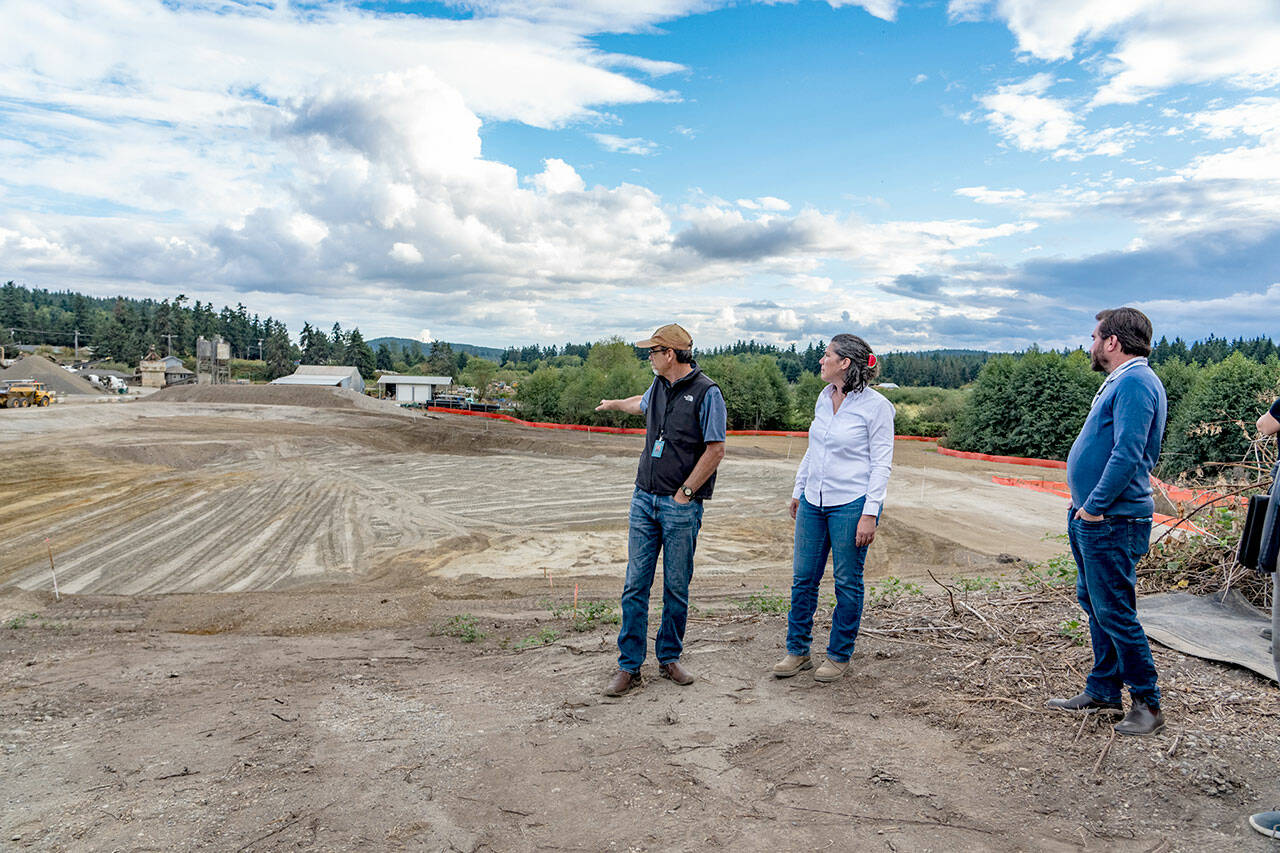PORT HADLOCK — Jefferson County officials broke ground on the $35 million Port Hadlock sewer project, which will eventually allow a new neighborhood of affordable housing to be built on the site.
Ground work began at the site in July and the kickoff ceremony was held Tuesday with local officials including the Board of County Commissioners and state Reps. Steve Tharinger, D-Port Townsend, and Mike Chapman, D-Port Angeles.
Instead of a typical groundbreaking ceremony with a golden shovel, Tuesday’s event featured a friendly competition between the county commissioners using a mini excavator to collect and move dirt into a target box, according to Robert Wheeler, project manager for the sewer project with the Jefferson County Department of Public Works.
Five-inch golden toilets were given as prizes, Wheeler said, with District 1 Commissioner Kate Dean coming in first, District 2 Commissioner Heidi Eisenhour second and District 3 Commissioner Greg Brotherton third.
The sewer has been in the works for nearly 20 years, but it wasn’t until a $20 million appropriation from the state Legislature in 2021 that the project started to become a reality.
The sewer will service the Port Hadlock-Irondale Urban Growth Area, one of the few places in the county where urban expansion is allowed to take place under the state’s Growth Management Act.
Without a sewer system, only a few units of housing can be built in an area, but the sewer will allow for the kind of higher-density housing officials hope will ease the region’s housing crisis.
Habitat for Humanity of East Jefferson County owns a 17-acre parcel of land adjacent to Jefferson County Library and Chimacum Creek Primary School, both of which will be serviced by the sewer. Without a sewer, zoning rules would only allow three housing units on that parcel, but once the sewer is built, it will be able to have between 120 and 200 units.
Habitat for Humanity plans to build about a third of the housing on the site, said Executive Director Jamie Maciejewski, with the rest being built by partner organizations. But all of the housing that’s built on Habitat’s parcel will be affordable housing, Maciejewski said.
“Affordable for different levels of income,” Maciejewski said, “because market rate are not affordable for moderate income.”
Over the next 10 months, Maciejewski said Habitat will draft a master plan for the site, and construction on infrastructure and the first homes may take place in 2025. Habitat will hold community outreach sessions in the coming months to elicit feedback about the project and will conduct additional fundraising.
Maciejewski said Habitat hopes to partner with local organizations that are eager to see additional housing built in the area.
“Community members should really feel pleased that the government officials that we’ve elected and hired have been very focused on serving the community with this sewer project,” Maciejewski said.
The project was widely supported but not universally beloved. In 2021, a group opposed to the development — Concerned Residents of Port Hadlock — circulated a petition demanding greater transparency from the county.
Wheeler said the county has broken the project up into smaller phases in an effort to give contractors a better chance at offering the lowest bid. The current work at the site is being done by Port Townsend-based Seaton Construction, Inc.
Bids for the next portion of the project, construction of the water treatment plant and first phase of sewer lines, will go out this fall, Wheeler said.
In addition to allowing greater density in the urban growth area, the sewer will connect existing homes in the area that are currently on septic systems. Some homes in the area will be required to connect to the system, Wheeler said, while others will be given the option.
The county has grant funding available to pay for a certain number of connections, which Wheeler said will provide incentive to homeowners to volunteer to connect.
The construction of the treatment plant and sewer lines to the core Port Hadlock area will hopefully be done by 2025, Wheeler said.
Jefferson County will need to update its comprehensive plan to incorporate the planned expansion for approval by the state, and once that happens, developers like Habitat for Humanity can start to apply for permits.
Wheeler said the county has acquired $35 million for the project through various grants, loans and state appropriations and that so far bids have come in lower than expected.
________
Reporter Peter Segall can be reached at peter.segall@peninsuladailynews.com.

